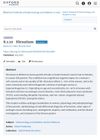TLDR Hirsutism in women is often due to hormone sensitivity and has significant psychological effects.
This review article from 2001 examined the causes, physical assessment, treatment, and pharmacological therapies for hirsutism, a condition where females develop terminal hair in patterns typical of adult males. It highlighted the significant psychosocial impact and potential underlying endocrine abnormalities associated with hirsutism. The condition results from the sensitization of androgen-dependent hair follicles, converting vellus hair to terminal hair. Over 70% of women with androgen excess exhibited hirsutism, though not all cases were linked to detectable androgen excess, suggesting increased end-organ sensitivity to androgens. The article also discussed future developments in the assessment and treatment of hirsutism.
1947 citations
,
September 1995 in “New England journal of medicine/The New England journal of medicine” PCOS is a common hormonal disorder causing irregular periods and increased hair growth, linked to insulin resistance and long-term health issues.
34 citations
,
January 1995 in “The Journal of Clinical Endocrinology and Metabolism”  135 citations
,
August 1994 in “Clinical Endocrinology”
135 citations
,
August 1994 in “Clinical Endocrinology” Most women with hirsutism or androgenic alopecia had polycystic ovaries, especially if they had irregular periods.
 78 citations
,
May 1989 in “The Journal of Clinical Endocrinology & Metabolism”
78 citations
,
May 1989 in “The Journal of Clinical Endocrinology & Metabolism” Spironolactone effectively reduces hair growth in women with hirsutism and is generally well-tolerated.
 1 citations
,
August 2013 in “Springer eBooks”
1 citations
,
August 2013 in “Springer eBooks” Birth control pills and anti-androgen medications help manage hair growth, acne, and hair loss in women with PCOS.
 70 citations
,
February 2012 in “Human Reproduction”
70 citations
,
February 2012 in “Human Reproduction” Many young women who donate blood have hormonal disorders like excess male hormones and PCOS.
 3 citations
,
January 2012 in “Hanyang Medical Reviews”
3 citations
,
January 2012 in “Hanyang Medical Reviews” The document concludes that more research is needed to create suitable diagnostic criteria and understand PCOS in Korean women, and genetics may allow for personalized treatment.
 July 2011 in “Oxford University Press eBooks”
July 2011 in “Oxford University Press eBooks” The document's conclusion cannot be determined without content to analyze.
 10 citations
,
January 2011 in “Skin therapy letter”
10 citations
,
January 2011 in “Skin therapy letter” Women with PCOS often have acne because of high androgen levels, and the article reviewed how to treat this type of acne.







